The Introverted Myers-Briggs Personality Types That Make the Most Money

If I asked you which factors determined your salary, what would you say? It seems fairly obvious that your education, experience, and marketable skills can all have a positive effect on pay. You may have even considered trying to boost your salary by switching industries or going for a supervisory role.
But you also may have wondered if there are other factors at play. You may have noticed that all the promotions in your office seem to go to extraverts, or that the juicy assignments always fall to the people who chat up the boss. Could there be more fundamental personality traits that impact what you earn?
Existing studies tell us that personality traits do correlate with income, but they don’t tell us which personality types might earn the most. This is because most research is based on the Big Five model, which does not describe personality in terms of types. So, we at Truity set out to illuminate how income might relate to personality according to Myers and Briggs’ system.
We asked 72,331 respondents to fill out our TypeFinder® personality assessment and provide us with information about their salary and employment status. The TypeFinder measures personality preferences on each of Myers and Briggs’ four dimensions, as well as measuring 23 more detailed facets of personality type. This in-depth measure allowed us to look much more deeply into the specific traits that may give an income advantage.
What we found were some fascinating associations between income and personality. And spoiler alert — if you want to make money, then slow and steady may just win the race.
Which Introverted Types Earn the Most?
We started by calculating the average yearly income for each of the personality types, using data provided by respondents over the age of 21. As you can see in the chart below, income was highly variable from one introverted personality type to another. In fact, the differences were dramatic, with a difference of over $16,000 between our highest and lowest introverted earners.
Thinking and Judging types (specifically the ISTJ and INTJ) dominated the top of the introverted earnings charts, with INFPs and ISFPs bringing up the rear.
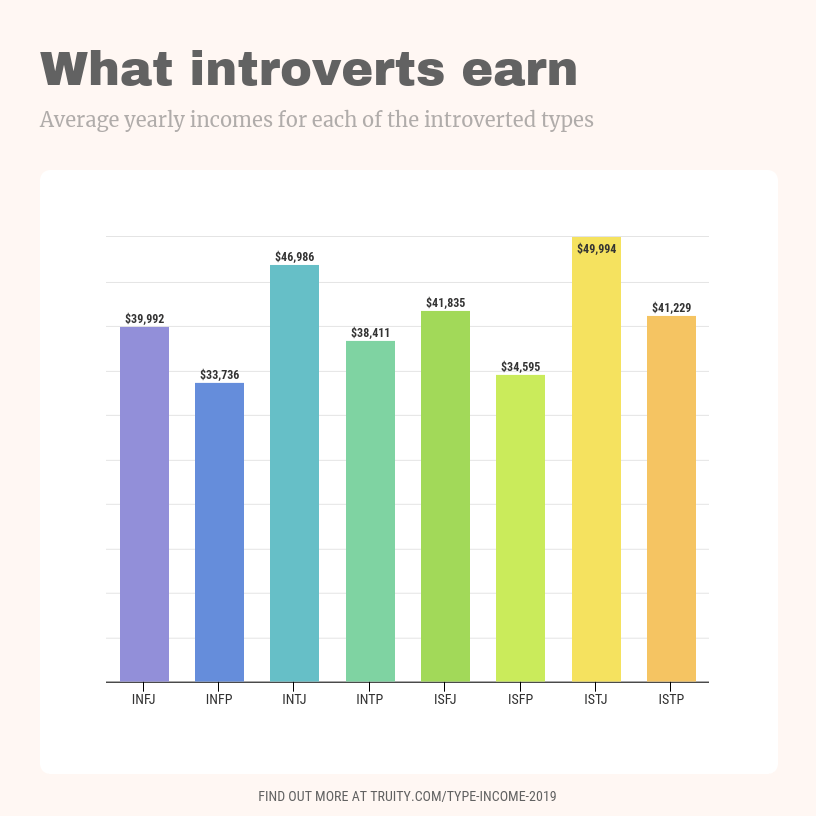
Like what you’re reading? Get an email whenever we write about your personality type. Subscribe to our type-specific newsletters here.
Personality Preferences That Make a Difference
If you’re a Thinker or Judger, you’ll be pleased to learn that your personal deck is stacked towards high earnings. The chart below digs into the eight personality preferences that make up type, and it shows that Judgers and Thinkers earn more on average — quite a bit more.
Thinking seems to have the greatest effect, with Thinkers earning about $8,000 a year more than Feelers. Judgers are up by nearly $7,000 per year compared to their Perceiving peers.
As you may have noticed, there’s another trait that seems to make a big difference to your earning potential: introversion. Extraverts out-earn introverts by almost $10,000. But don’t despair — this finding is not the end of the story for introverts.
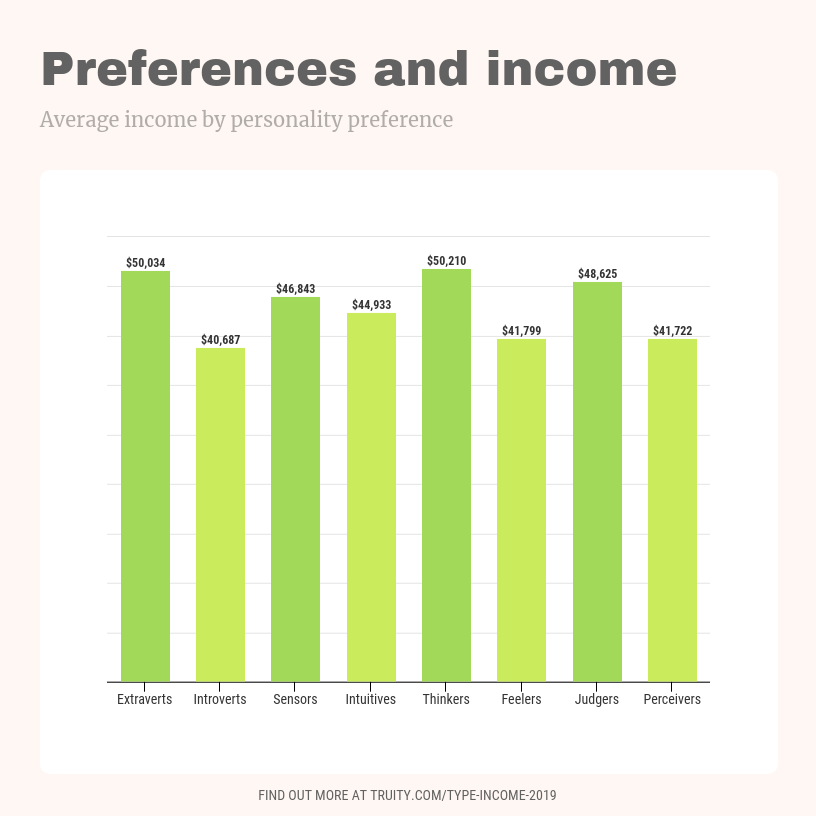
Why Do Some Personality Types Earn Less?
Why do Feelers and Perceivers earn less? Our understanding of Feeling types suggests that they tend to look for careers that are consistent with their values, regardless of the job’s income potential. Perceiving types are sometimes described as less goal-driven than Judgers, potentially leading them to advance less quickly.
To try to check our assumptions about how different types approach their careers, we dug into employment status information provided by our respondents. This analysis showed that different personality types seemed to have different reasons for earning smaller salaries.
ISFPs and ISFJs were much more likely to report that they were staying at home to parent their children. All four of the introverted intuitive types (the INFJ, INFP, INTJ, and INTP) were more likely to report that they were students.
Perceiving types were more likely to say that they were simply unemployed.
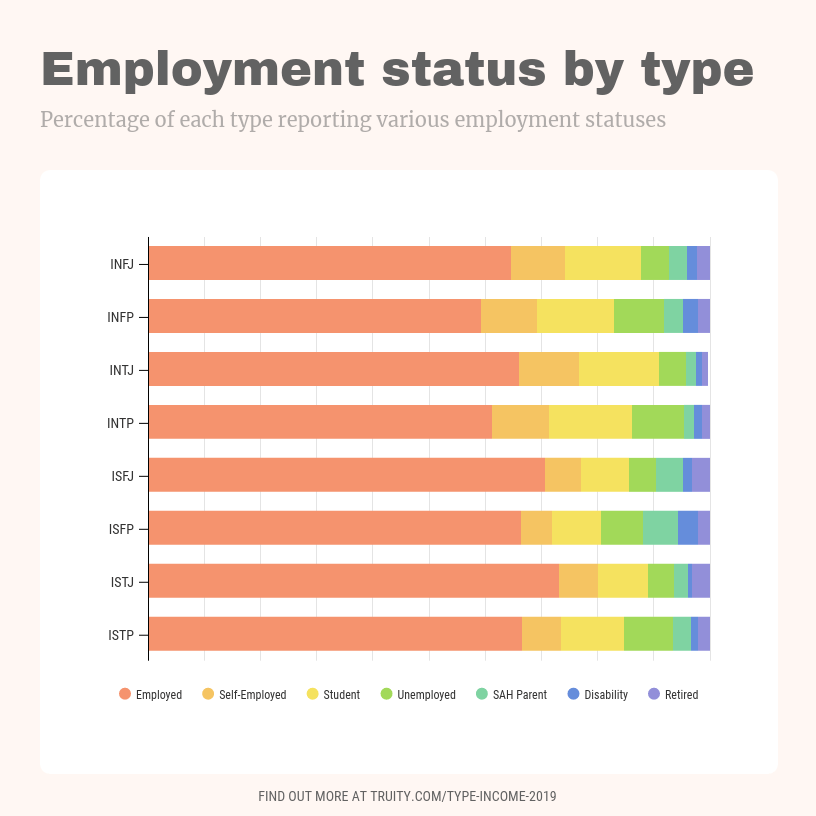
Slow and Steady Wins the Race
Now this is where things get interesting. If introverts are taking time out in the midst of their earning years to care for a family or pursue higher education, it follows that they may simply be slow starters in the earnings race. To explore this, we looked at average income for each introverted type across the four decades of a typical working life. You can see the various career arcs on the chart below.
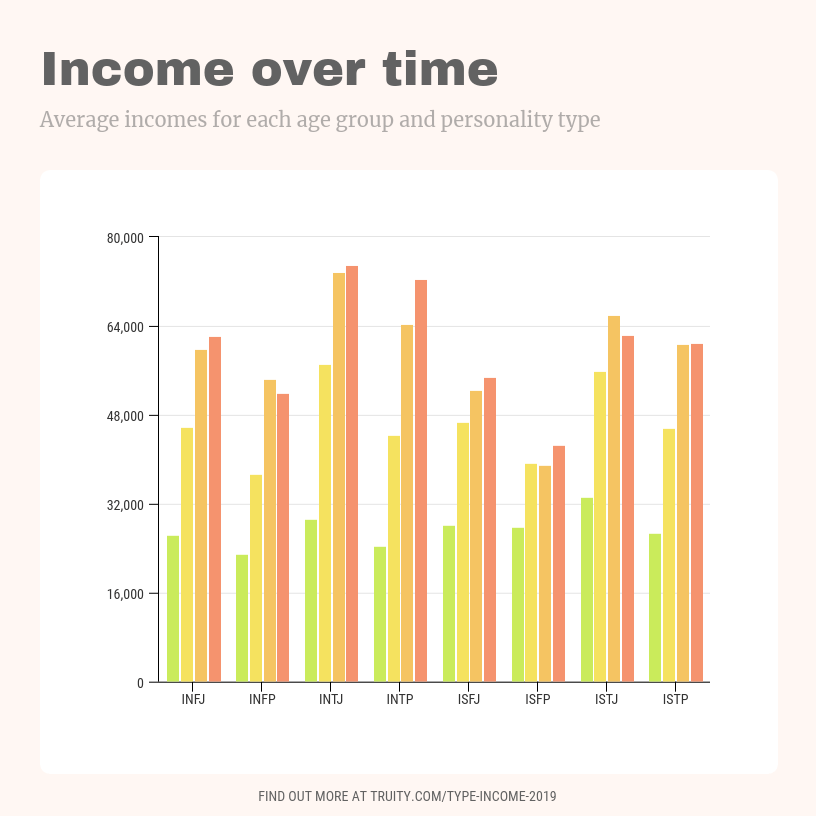
What this chart shows is that all eight introverted types can expect to earn more — much more — as they hit their strides in their forties and fifties. All but two of these types (INFP and ISTJ) hit a peak in their fifties. This is the decade when introverts earn their highest incomes, which suggests that introverts are not characteristically low earners — they may just be late bloomers. This is particularly true for INTPs, who start near the bottom of the salary charts in their twenties but end up second only to INTJs by the time they hit their fifties.
To put this in perspective, pay growth for most of our extraverted types actually slowed down as they aged. So while extraverts earn more from the get-go, a lot of them are peaking in their forties. Introverts, in contrast, keep on climbing right to the end.
Why is this the case? It’s not clear from this data. Certainly, taking time out for education and family duties will impact a person’s career trajectory, but there may be other factors at play. One possibility is that introverts may be taking more time to decide where they want to be in their careers. Perhaps an introvert’s career arc is like so many other aspects of an introvert’s life — carefully considered, cautiously developed, and full of quiet power in the end.
The Personality Traits That Impact Your Paycheck
It seems clear that extraverts, Thinkers, and Judgers tend to earn more. But we wondered if we might be able to understand exactly what it was about these types that correlated with income.
To answer this question, we turned to data on the 23 detailed facets of personality that are measured by the TypeFinder. These are more granular personality measures that flesh out our understanding of each dimension. For instance, the Thinking dimension includes facets such as challenging (denotes a person who enjoys debate and does not avoid conflict), objective (denotes a person who makes decisions based on data and rational arguments, rather than personal concerns) and rational (denotes a person who prefers not to get emotional or be around others who are expressing strong emotions).
Having access to this level of detail allowed us to dive much deeper into the relationship between personality and income. We found that some facets clearly correlated with higher income, while others had no apparent effect on a person’s paycheck.
For introverts, we found five key traits which had the biggest impact on earnings:
Expressive — Tends to share thoughts and feelings readily. Quick to speak up. Not reserved. Others usually know what’s on this person’s mind.
Disciplined — Resists distractions and impulses. Not easily tempted by things that are counterproductive to goals.
Conscientious — Puts work first, play second. Focuses on responsibilities and what needs to get done, and is interested in fun only when chores are done.
Energetic — Has a high energy level and likes to stay busy. Has many things on the to-do list and tends to bustle about.
Orderly — Keeps things organized. Appreciates structure and having a system for where things should be.
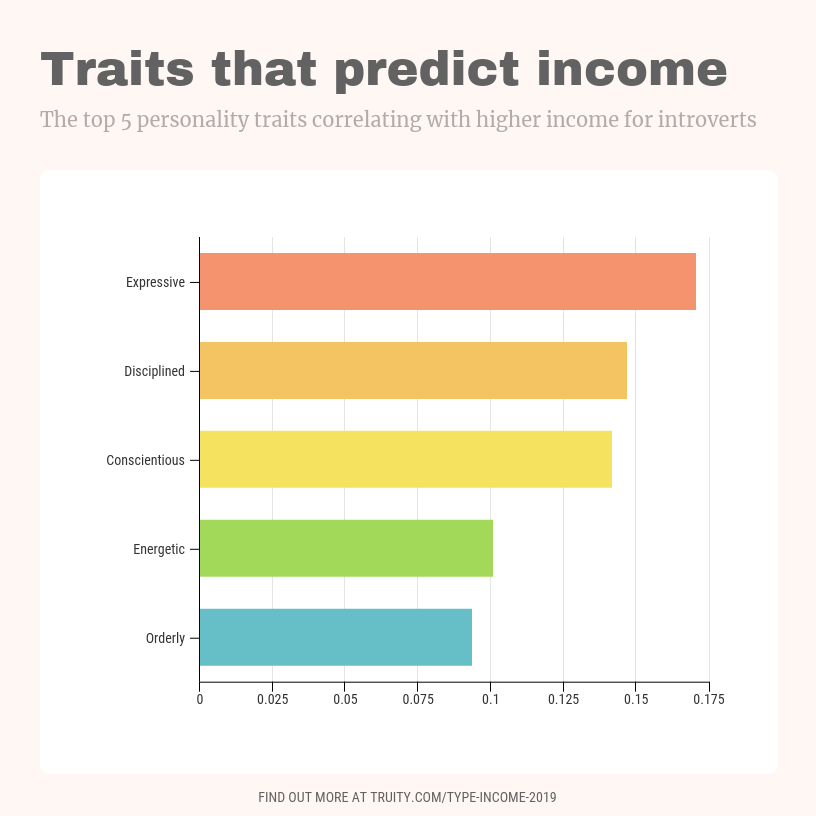
There are two key conclusions here. The first is that introverts who are more expressive tend to see a payoff in their earnings. Although an expressive style is more typical of extraverts, introverts who have adopted a more outspoken demeanor seem to be rewarded financially. Introverts who are willing to put themselves out there and be clear about their opinions may earn more.
The second interesting result is the relationship between discipline, conscientiousness, and income. These correlations are suggestive only, but they are consistent with a common ethos of hard work: that delivering steady and reliable results over time is the key to earning more.
The Long View for Introverts
The biggest takeaway is that, for introverts, persistence appears to be key. While some personality types may see a quicker payoff in the workplace, the typical career style of the introvert seems to be the “slow burn.” Whether taking time to further their education, take care of family, or just decide what exactly it is they’re suited to do, introverts seem to make choices that bring them to financial success later in life.
If after reading this you’re worried that you don’t possess the “powerhouse” traits for earning loads, take heart — there is good news. Other research has clearly shown that working with your strengths pays off. Even if you’re not suited to be a corporate killer, finding as job that’s a good fit for your personality can yield some pretty significant financial returns.
Although this data is suggestive, it is by no means the last word. Income is influenced by a whole host of factors, of which personality is just a small part. But if you want to be successful in your career, it can help to have a strong work ethic, set ambitious goals, and be open about what’s on your mind. Cultivate some of those high-earning behaviors, and you might see a boost in your paycheck. ![]()
